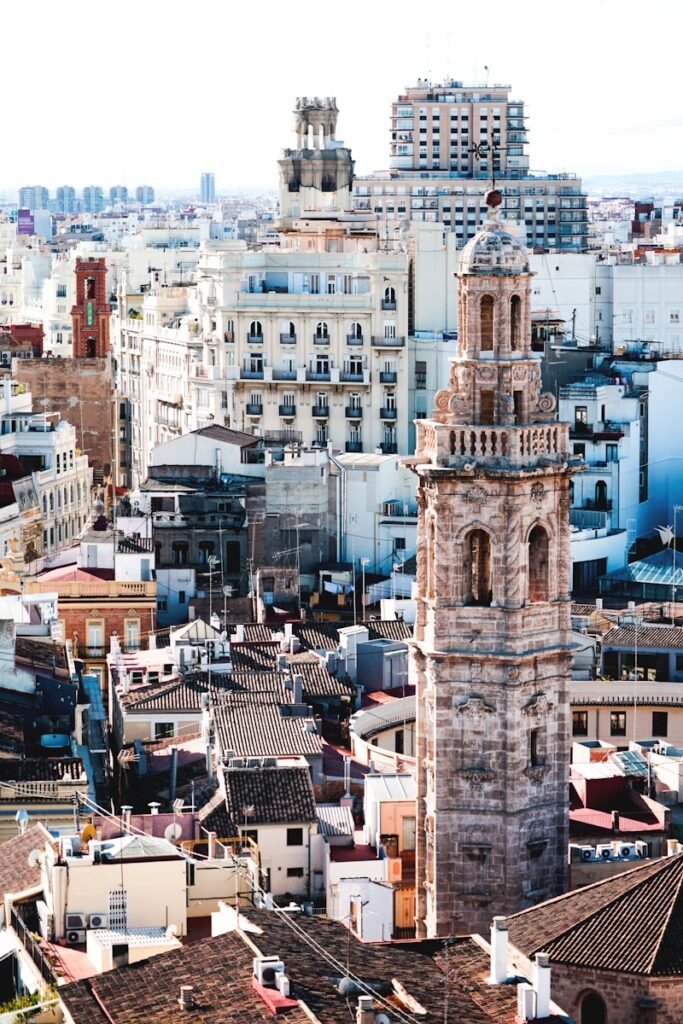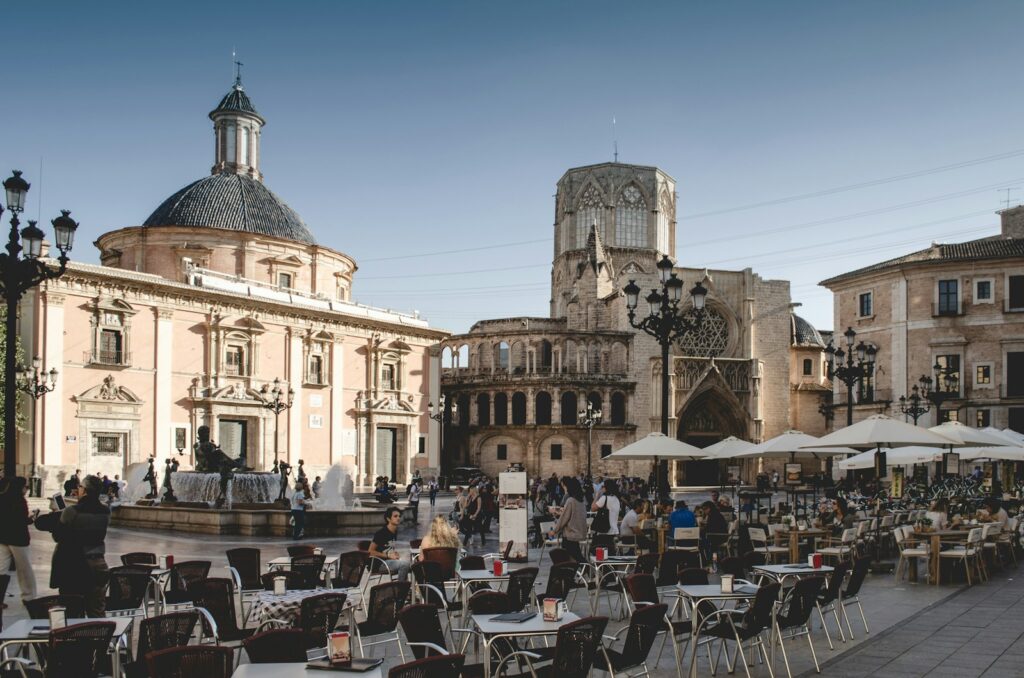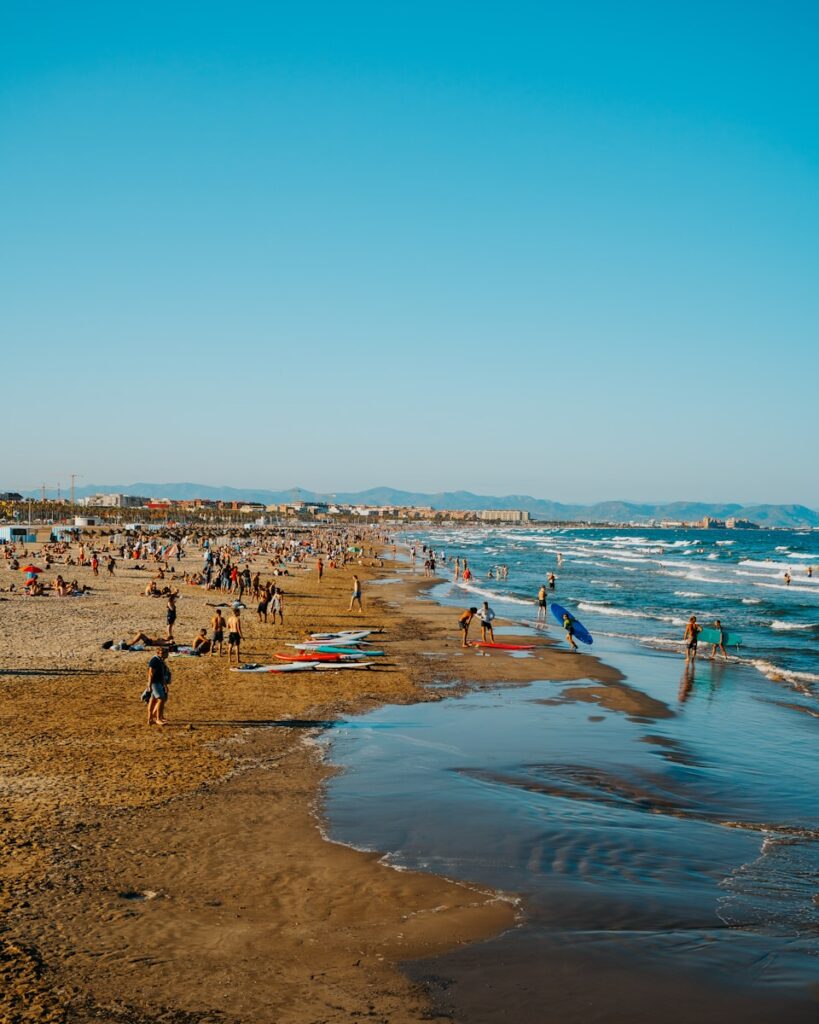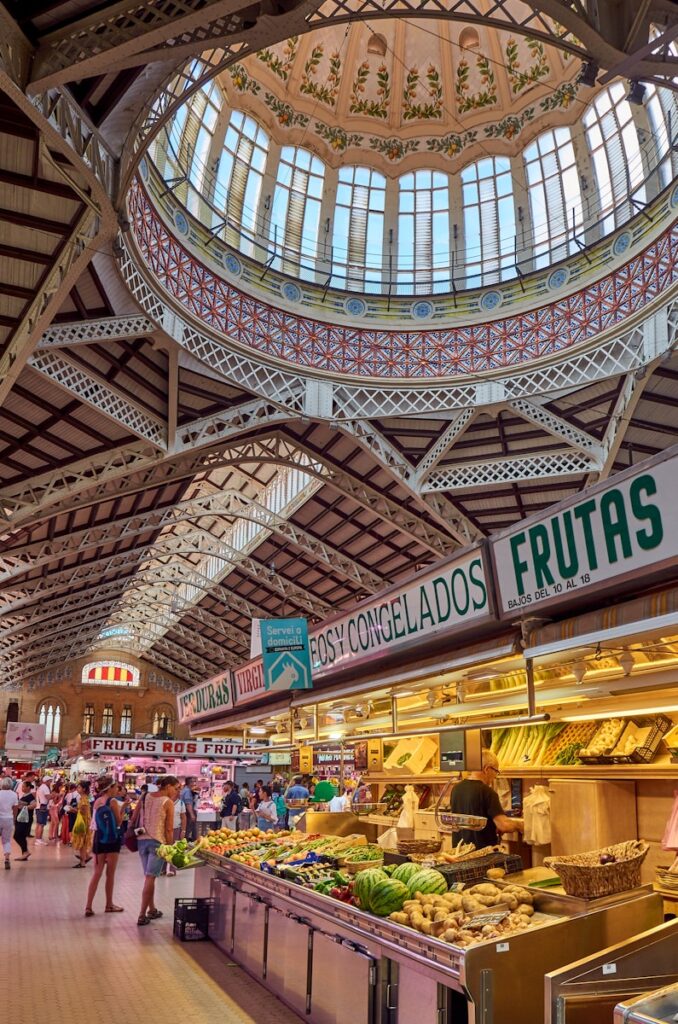The ultimate guide to relocating to Valencia in 2024
Coming up: parties, paella, people, picking a place to live, some pro-tips and lifehacks, and everything you need to know about moving to Valencia.
The third-biggest city in Spain, shoreside Valencia is home to around 800,000 people (and many more live in the wider area).
Of those, around 100,000 are foreign-born: so it’s a common place for a relocation.
Why?
Mainly cos of great food, weather, and people—and some pretty appealing low prices.
So coming up, we’ve brought you juicy information on all that and more:
We’ve covered pros and cons, visas and bureaucracy, public transport, quality of life, eating and drinking, learning Spanish, why you’ll make loads of friends, and plenty more.
Today, Homelike are bringing you everything you need to know about relocating to Valencia. Bring some sunscreen and come join the party!
Why move to Valencia?
Perks of moving to Valencia include:
- Excellent weather: one of the least-rainy cities in Spain, Valencia offers year-round average temperatures of between 52°F (11°C) and 73°F (22°C)—and the highs are often much higher. But because it sits on the sometimes-windy seaside, it rarely feels too hot.
- Low prices: to save money, moving to Valencia is a better choice than moving to Barcelona or moving to Madrid. Although it’s not the cheapest place on the planet, Valencia is more affordable than most western-European cities (we’ve covered some specific prices soon).
- It’s super safe: a big perk for people relocating to Valencia with kids. Expect very low risk of serious crime, no threats of natural disasters, and very little risk of terrorism. Newcomers to Valencia often report feeling very safe.
- FOOD! Most people agree Valencia is Spain’s best city for local food. The home of paella, Valencia serves up seafood, age-old delicacies, Spanish treats you won’t have heard of, a surprisingly wide range of local fayre, and a bunch of Michelin Stars.
- Authentic atmosphere: relocating to Valencia feels like you’re *really* relocating to Spain (whereas, because Barcelona and Madrid are more cosmopolitan, you don’t get so many local vibes). Expect an appealing combo of multiculturalism and tradition.
- Loads of nearby day trips: including Albufera National Park, Garbi Mountain (the region’s highest viewpoint), the hikes and hot springs of Montanejos, pretty towns (like Xátiva, Sagunto, and Buñol), and many caves and castles.
- Good work-life balance: overall, Valencian people prioritize their social lives over their work lives—and you’ll rarely feel burned out or overworked. Recently, the city even trialed a four-day work week!
- Lots of parks: Valencia is one of the greenest cities in Europe—“90% of the city’s population has a green area less than 250 meters away.”
Some of the cons of relocating to Valencia include…
… slow bureaucracy, general noisiness, the tough housing situation (more on that soon), often-high humidity, and a difficult job market.
But, overall, the pros of relocating to Valencia absolutely outweigh the cons.

Visa requirements for moving to Valencia
If you’re moving to Valencia from another part of the EU/EEA area, you DON’T need a visa. And if you’ll be staying fewer than three months, you don’t need to do anything at all! For stays longer than three months, you only have two main tasks: registering your residence, and getting your NIE number (Foreigner Identity Number). More on that second task soon.
If you’re moving to Valencia from somewhere other than the EU/EEA area (including the UK!), you WILL need a visa*.
All the different options are listed here—but most people will want one of the work visas (of which there are many available options). After you get your visa, you’ll need to get a temporary residence permit (and after 5 years of temporary residency, you’ll become eligible for permanent residency).
*That said, many nationalities can stay in Spain for up to 90 days with no visa—so if you’re only moving to Valencia for a short while, you might not need a visa. Here’s a list of all the eligible nationalities.
If you’re a digital nomad relocating to Valencia, you’re in luck: the nation recently released a digital nomad visa. To apply, you need a valid passport, a clean criminal record, and to earn at least $2700 per month (or $32400 per year)—along with proof of those earnings. If your application is successful, you can live in Spain for up to 5 years.
Best neighborhoods to live in Valencia
Valencia is bigger than most people expect…
… and features 88 neighborhoods (divided over 19 different districts).
Some of the best include:
- North Ciutat Vella: the northern part of the very center of the city, this is where you’ll find lots of famous sights, loads of events, and endless places to eat, drink, and dance. If you’re relocating to Valencia for just a little while, you’ll love it.
- Russafa: the most happening neighborhood in the city (and also known as ‘Ruzafa’), this neighborhood is packed with hipsters, gentrified hangouts, vintage stores, chic cafes, and lots of edgy nightlife.
- El Pilar: if you’re moving to Valencia with kids, this is an ideal choice. It’s relatively central but it feels removed from all the tourist sprawl. It offers good jobs, laid-back bars and cafes, and close proximity to all the central stuff.
- La Xerea: the far-eastern side of the city center, La Xerea is relatively central, very residential, and close to lots of green spaces. If you’re relocating to Valencia with kids or dogs, this is an ideal choice. Other perks include a bunch of high-end bars, boutiques, and artsy venues.
- El Cabanyal: a good choice if you’re moving to Valencia long-term. Sitting on the shore (and far from the center), you get good beaches, low-cost homes, local friends, lots of tasty seafood, and authentic insights into what Spanish life is really like.
For way more information, here’s Homelike’s guide on the 10 best neighborhoods in Valencia.
Finding accommodation after moving to Valencia
For most people moving to Valencia, finding a nice home is one of the toughest challenges of relocating to the city:
Many local landlords don’t speak English, lots of homes are low-quality, some don’t come furnished (and even some of the ‘furnished’ ones are pretty bare), and it’s hard to know if you’re getting a fair price.
For that reason, many newcomers (especially in the short-term) choose to move into a serviced apartment after relocating to Valencia. Good serviced apartments (like ours!) are cozy, fully-furnished, and ready to move into today. And you don’t need to waste your time on bargaining, negotiating, or struggling with language barriers.
That said, it’s possible to find a nice place if you’re patient and persistent. Apart from Homelike (yep, that’s us!), some of the best websites for finding a place to live in Valencia include Idealista, Fotocasa, and the Valencia property groups on Facebook.

Navigating bureaucracy in Valencia
After moving to Valencia, you have three main bureaucratic tasks to take care of:
- Getting your foreigner identification number (NIE)
- Getting your empadronamiento
- Opening a Spanish bank account
- To get your NIE number…
(… which is your unique foreigner identification number…)
… you can:
- Visit your local immigration office (if you’re already in Spain)
- Or visit your local Spanish embassy or consulate (if you’re still in your home country)
EVERYONE needs an NIE number: it’s essential for working, getting a bank account, and other bureaucratic stuff—and it essentially functions as your tax identification. And it’s hard to find a job without your NIE number. Here’s more information.
To get your ‘empadronamiento’ number (‘empadronamiento’ translates to ‘census,’ and going through the process is essentially just registering your long-term presence in Spain), you can either:
- Go to your local town hall (‘ayuntamiento,’ in Spanish)
- Or go through the process online here.
Again, getting your empadronamiento is essential, and you need it for lots of daily long-term-life tasks (like buying a home or renting a car). Everyone needs to do it; even Spanish people, and those who’ve moved to Valencia from another part of Spain. That said, you’re only required to get your empadronamiento if you’ll be living in any one Spanish city for 6 months or more.
To open a bank account, we recommend the online-only banks bunq and n26 (the signups are fast, everything is managed on easy apps, and you don’t need to visit a physical bank).
(that said, if you’d rather visit a physical bank, top choices include BBVA, Santander, and Banco Sabadell).
To open a bank account, you usually need to provide ID (like your passport), your NIE, proof of address (even if it’s just a temporary address), and proof of your employment status.

Learning Spanish
If you’re relocating to Valencia for more than a few months, you should learn Spanish*.
(*you’ll be better equipped for dealing with bureaucracy and daily life, you’ll make more friends, you’ll be able to talk to anyone, and Spanish people will appreciate your attempts to immerse yourself into local life. And English levels in Valencia aren’t as good as some newcomers expect)
To get started, hop on Duolingo. It’s a fun colorful game, and takes you from the very basics to some surprisingly tricky territory. Other good options include Babbel and Rosetta Stone… while Lingoda and Preply are popular for combining face-to-face online classes with a load of other resources.
(top tip: if you can speak English—and you can cos you’re reading these words right now!—you’ll find it pretty easy to learn Spanish).
If you want to learn in-person (and make friends while you do it!), consider attending a language school in Valencia. Here’s a list of the best options.
Valencia’s culture and people
After moving to Valencia, you’ll find the city’s people very friendly and open—but making friends is WAY easier if you can speak Spanish (even if it’s just a little).
To make friends, one of the best places to start is Facebook. Search for terms like ‘expats in Valencia’ and ‘events in Valencia,’ and you’ll find groups like this one, this one, and this one.
You can also use these Facebook groups to find clubs and societies—search for your hobbies (running, chess, hiking, cycling, karaoke, whatever), and you might find folks or clubs who do them.
Another option is the Couchsurfing app: although it’s primarily an accommodation website, it’s also useful for finding hangouts, events, and local people who want to make friends with foreigners.
Here are more things you can expect from the city and its people after moving to Valencia:
- It’s very clean, and relatively organized
- Valencian people can be quite direct and loud
- It feels a little more traditional than Spain’s other big cities
- Valencian people are very proud of their city, food, accent, and heritage
- Bureaucracy takes longer than most foreigners expect—any administrative tasks you need to do, start them as soon as you can!
- It feels way less touristy than Barclona and Madrid (and many of the places on Spain’s south coast). In some ways, Valencia has a slight village vibe
For more, here’s a breakdown of ALL the culture shocks you might experience after moving to Spain.
Quality of life in Valencia
You’ll find a great quality of life after moving to Valencia:
In the InterNations ‘Expat City Ranking 2023’ Quality of Life study, Valencia came 1st(!) from 49 cities across the world.
In that same study, it also ranked:
- 2nd in the world for healthcare
- 1st in the world for affordability
- 4th for quality of medical care
- 3rd for travel and transit
- 3rd for leisure options
- 5th for environment and climate
- … and 1st for opportunities for recreational sports
Other quality-of-life perks include:
- Work-life balance: people place a big priority on spending time with friends and family. In the 2023 Forbes Advisor list, Valencia ranked 24th in the world for work-life balance.
- Very few people do extra unpaid work outside their official working hours: once your work day is over, you’re not expected to be checking your emails or making work calls.
- Spain has the highest life expectancy in the entire EU, with an average of 84.12 years across all genders.
- The typical work-week is 40 hours per week, with a pretty-common 3-hour break (that’s the iconic siesta period!) during the day.
You’ll also find a huge number of things to do:
The city is home to over 60 cultural spaces (including over 30 museums), world-class year-round nightlife, lots of music festivals* (with an extended calendar of events because of the perpetual good weather), and things to do every day.
And because the weather is so good (and the city is so green), you’ll always find people picnicking, chilling, and lounging around outdoors.
*Some of the city’s best music festivals include:
- Big Sound Festival
- Festival de Les Artes
- The massive Las Fallas (a colorful two-week spectacular with bonfires, wooden sculptures, and weird cartoony figures)
- The iconic annual food fight festival of La Tomatina (though this world-famous festival actually takes place in the close-to-Valencia town of Buñol)
- … and because the city is in some ways quite traditional, you also get many old-school religious festivals.
That said, it’s not all perfect: for many reasons, the job market can be tough. If you’re not working remotely, you’ll probably need to speak Spanish to get a reasonably-paying job.
According to SalaryExpert, average salaries in Valencia sit at €32,387 per year (an average hourly rate of just over €15.50 per hour). Spain’s national wage (including in Valencia) sits at €1,323 per month (€15,876 euros per year).
Transport in Valencia
After relocating to Valencia, you’ll find top-quality public transport.
You get:
- 4 tram lines
- 60 bus lines
- 5 metro lines
- 150 kilometers (93 miles) of bicycle lanes
- Lots of dotted-throughout-the-city hire bikes
- … and a big international airport with direct connections to over 100 other cities
This public transport is very easy to use: you’ll find maps everywhere, all the public transport types are well-connected to one another, and you can get around by having a Mobilis Card (this card allows you to travel easily and affordably on all the city’s forms of transport).
… so it’s absolutely possible to explore the city without your own car (and many people get around Valencia exclusively by bicycle). If you want to reach other parts of Spain, you’ll usually be able to get there by bus or train (although you will need a car to reach some of the nation’s most remote and rural pockets).
Valencia is also a very walkable city. Sidewalks are big, drivers are mindful of pedestrians, and the entire city is very flat. That said, the city isn’t small enough to walk from one side to the other side (unless you’re only wandering within the very center of the city).
Cost of living in Valencia
After relocating to Valencia, here are the prices you can expect to pay:
- 1-bedroom apartment in the city center: €938
- 1-bedroom apartment outside the city center: €689
- 3-bedroom apartment in the city center: €1,560
- One-way ticket on local public transport: €1.50
- Regular monthly pass for local public transport: €30
- Meal for 1 at an inexpensive restaurant: €12
- 3-course meal for 2 people at a mid-range restaurant: €40
- Large draught domestic beer in a bar or restaurant: €2.50
- Regular cappuccino in a cafe or restaurant: €1.68
- Loaf of white bread from a supermarket: €1.02
- 12 regular eggs from a supermarket: €2.50
- 1kg of chicken breast filets from a supermarket: €7.66
For more, head to Numbeo—where you’ll find loads of accurate crowd-sourced cost-of-living stats.

Moving to Valencia from the UK
If you’re moving to Valencia from the UK, you can stay for 90 days with no visa.
For longer stays, you’ll need to apply for one of the visas we’ve outlined above (again, most people will want to apply for some type of work visa).
That said, lots of UK people decide to retire in Spain—if that’s your plan, here’s all the information you need.
UK folks relocating to Valencia will find:
- Life is more affordable
- The weather is way better
- More cheek-kissing and hugging
- People are more open and warm
- The work-life balance is a little better
- Cities (and communication) are louder
- Dinner is eaten a lot later than in the UK
- People are more relaxed about punctuality
- People go to bed later, and wake a little later
- Local food is better—but the culinary diversity isn’t as wide
Moving to Valencia from the US
If you’re relocating to Valencia from the US, you can stay for 90 days with no visa (but will need the appropriate visa for any longer stays—usually one of the work visas) .
After moving to Valencia from the US, you’ll find:
- A slower pace of life
- Spanish people communicate more directly
- Mealtimes are later—and breakfast is smaller
- People spend more time with family and friends
- Public transport is way better (so fewer people have cars)
- Opening hours can be a little more limited (especially on Sundays)
- Tipping isn’t mandatory (though is appreciated)—and 10% is the maximum you’ll typically tip
Moving to Valencia as a digital nomad
If you’re relocating to Valencia as a digital nomad, you should apply for Spain’s digital nomad visa.
Good news: Spain has a ‘double-taxation agreement’ with 90 countries (including the US, UK, Australia, and the EU)… so if you’re already taxed in your home country, you don’t have to pay tax again (on the same income) in Spain.
Because of its low prices and cozy blend of sea and sun, Valencia is one of the best places in Spain for digital nomads. Other good choices include Barcelona, Madrid, Alicante, and Malaga.
Moving to Valencia: final thoughts
Aaaaaand we’re done: that’s everything you need to know about moving to Valencia.
As you’ve hopefully worked out by now, it’s a lovely place to live: you get great weather, friendly people, world-class food, lots of outdoor adventures, and a surprisingly affordable life.
But it’s not all good news: like most people who move here, you’ll probably struggle to find a nice place to live. And even if you do find a good place, you’ll spend endless hours bargaining, viewing, negotiating, meeting landlords, and struggling with language barriers.
To cut out all the stress, many Valencia newcomers move into serviced apartments. All of ours are comfy and cozy, they’re ideal for living and working, they’re fully-furnished, and they’re ready to move into today. And because all the prices are listed, you don’t need to worry about whether you’re paying a fair price.
For more on moving to Spain’s third-biggest city, here’s our guide for expats in Valencia (featuring info on the best neighborhoods for eating, drinking, and partying).
Thanks for reading, thanks for choosing Homelike, and enjoying living in Valencia. See ya!






















